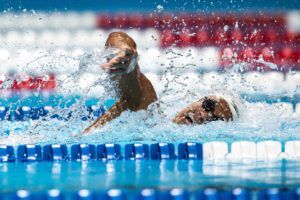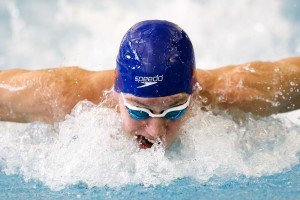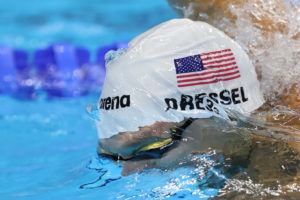We’ll be previewing the top 10 men’s and women’s programs from the 2016 NCAA Championships – stay tuned to our College Swimming Previews channel to catch all 20. Can’t get enough college swimming? Check out the College Preview issue of SwimSwam Magazine for more team previews and power rankings of every major Division I conference.
Key Losses: Pawel Werner (12 NCAA points, 1 NCAA relay), Corey Main (1 NCAA point, 3 NCAA relays), Arthur Frayler (2 NCAA points), Austin Manganiello (SEC finalist)
Key Additions: Maxime Rooney (CA – free/fly/back), Chandler Bray (IN – breaststroke), Nazareno Boscaino (FL – distance free), Drew Clark (FL – free)
2015-2016 Lookback
After years of being pigeonholed as a distance/mid-distance program and criticized for a dearth of sprinters, the 2016 post-season was a massive statement for coach Gregg Troy & co. Sophomore Caeleb Dressel showed massive development in surpassing even his NCAA Championship freshman season. This time around, Dressel not only won the 50, he also put together a great 100 and won that race after missing the entire top 16 as a freshman.
Dressel set American records in both races, Florida finished within the top 5 in all five relays and the Gators took third overall, just 17 points out of being the best non-Texas team in the NCAA while scoring in every single swimming event except the two breaststrokes.
Sprint Free: A+

Maxime Rooney (photo: Mike Lewis)
Dressel returns to that sprint group after making the Olympic team and winning a gold medal as part of the 4×100 free relay. And though the team graduates its second-best sprinter (New Zealander Cory Main) the sprint group actually gets better with the addition of #1-ranked recruit Maxime Rooney.
Rooney is at his best through the 100 and 200 frees, but is likely good enough in the 50 (20.1) to have a shot at the Florida 200 free relay. Add his 42.7/1:33.7 to Dressel’s 18.2/40.4 and Florida has a pair of NCAA-scoring caliber threats on both of its sprint free relays.
Depth isn’t perfect, but there’s some developmental talent. Austria’s Christoph Margotti was 20.1/43.7 last year as a freshman, and current freshman Viktor Toth has some upside. The relays are in great shape, with some versatile non-sprinters able to drop key splits (Jan Switkowski, 41.8, Mark Szaranek 19.2/42.3, Jack Blyzinskyj 19.0) on the free relays in crunch time.
Distance Free: A
The longer freestyles are where Florida sees its biggest personnel losses, but the team has historically been good enough at training endurance swimmers that the cupboard is far from empty.
NCAA scorer Arthur Frayler is gone, as is star 200/500 guy Pawel Werner. But the Gators still return NCAA 500 free runner-up Mitch D’Arrigo (1:32.6/4:09.9/14:49.6) and two NCAA mile scorers (D’Arrigo and junior Ben Lawless). Plus, junior Blake Manganiello is a potential NCAA scorer, though he had a great SEC meet but a rough NCAA meet last postseason.
And some interesting talents are on their way in, mainly from within state lines. Sarasota’s Drew Clark adds solid talent in the 500 (4:21.8) and mile (15:07). Tampa, Florida brothers Naza and Ludo Boscaino both man the distance races and should be conference-level scorers early on.
And including Rooney in the 200 free group makes the Florida 800 free relay one of the nation’s best, even after losing Werner. D’Arrigo and Rooney are kingpins of the lineup, and IMers Szaranek and Switkowski can both go 1:32s or better based on last year’s results.
IM: A

Jan Switkowski (Photo credit: Tim Binning)
Mark Szaranek is the latest IMer to shine in Florida’s program, which really tends to value and promote versatility more than almost any other team in college swimming. He was 6th in the 200 IM last year (1:41.5) and won the B final of the 400 IM in a time (3:39.28) that would have put him 6th overall.
Jan Switkowski was 4th at NCAAs in the 200 IM last year at 1:41.3. He could likely be a scoring 400 IMer as well, but has seen more action in the 200 free and 200 fly as his other events.
Florida’s freshman class last year was very IM-heavy, though they’re still mostly confined to the SEC level: Alex Lebed was 1:45.1 in the 200 and 3:46.5 in the 400, scoring SEC points in both and making the championship final of the 400. Brennan Balogh had a breakthrough swim in the SEC 400 IM C final to go 3:46.6 and dropped another half-second at NCAAs. He also cut two seconds in the 200 IM, down to 1:45.8. And Ross Palazzo also had some solid drops into SEC scoring range.
Fly: A
Switkowski is the team’s best pure flyer, placing 4th in both events at SECs. He was also 9th in the 200 at NCAAs, while dropping the 100 fly in favor of the 200 free.
Dressel is a massive boost to this group even with only one entry. He made the 100 fly his tertiary event last postseason, crushing a 44.40 to take 2nd in the nation and rocket to #3 all-time in the event’s history. Dressel has other options for his third event (100 breast, 100 back or even 200 free fit his lineup and 200 IM would be an option if it didn’t conflict with the 50 free), but sure seems destined to stick in this event for the coming postseason, even if he dabbles a lot elsewhere during the year. The only real threat to his swimming it might be if Florida chooses to use him on all five relays come NCAAs.
Outside of those two, Florida has to rely on some crossovers for depth. Szaranek is solid in the 200 and the backstroker Blyzinskyj in the 100.
Back: B
Jack Blyzinskyj is the team’s only returning NCAA scorer in the backstrokes, with 200 back B finalist Corey Main now graduated. Blyzinskyj is a solid two-event backstroker and has been a very solid relay leg for the Gators, but depth behind him is somewhat questionable.
Balogh and Bayley Main were both SEC scorers last year, but well out of NCAA scoring range. The Gators bring in a number of conference-level threats in their freshman class: Dakota Mahaffey, Tyler Silver and Taylor Delk. Maxime Rooney is an excellent backstroker as well, but he’s unlikely to swim either race in the postseason, given the 100 back’s conflict with the 200 free and the 200 back’s conflict with the 100 free.
Breast: C+
The team’s current Achilles’ Heel is breaststroke, where a black hole of relay options forced Troy to use Dressel as his medley relay breaststroker, essentially throwing away what could well have been a 39.9 anchor leg on the 400. In the 200 medley, the team went the opposite way, letting Dressel do his thing with an 18.00 anchor leg, but a 24-second breaststroke leg was basically a full-second handicap against the nation’s best.
Florida hasn’t fully solved its breaststroke problem, but at the very least, it may have solved its medley relay problem. Chandler Bray is one of the best high school sprint breaststroke prospects in a long while, coming in with a national high school record 52.6 in the 100.
Bray’s 1:59.8 wouldn’t quite score at SECs in the 200, but Florida has to be thrilled just to get a viable leg on both medley relays, which should free up Dressel to really crush the freestyles.
As good as Bray is, Florida still doesn’t grade out too well here, with almost no depth. 19th-place 200 guy Ross Palazzo was the team’s only SEC scorer in either breaststroke last year, and none of the incoming freshman are fast enough yet to pencil in as even SEC scorers.
2016-2017 Outlook

Caeleb Dressel – 2016 Olympic Games in Rio -courtesy of simone castrovillari
The breaststroke weakness won’t be nearly as crippling as last year if Bray can be an above-average relay leg, and that makes Florida scary as an all-around team. The Dressel-Rooney combination should be among the best 1-2 punches in NCAA freestyle, especially if Rooney develops the way Dressel has in Gainesville.
The Gators have a big freshman class, and based on history, we’ll probably see a few of them struggle or transfer under the program’s notoriously intense training, but we’ll probably also see a couple really blow up with time drops as the yardage kicks in.
While we’re on the topic of things we can expect of Florida based on the program’s history, here are a few more:
- Dressel will swim the 200 IM at some point midseason, prompting much discussion and handwringing about his training focus and his postseason entries.
- Dressel will still swim the 50 and 100 frees at NCAAs and resoundingly quiet all such discussions.
- The Gators will start to look extremely tired around the middle of the season, just in time for fans to sleep on them before an explosion with some rest.
- Troy’s mustache will return to form one of the NCAA’s most iconic, and Troy will perhaps be less likely to bet its continued existence on Dressel not being a historically-dominant speedster.

*fiend
I had to scroll back up and re-read some of those freestyle times before I remembered how much of a friend Dressel is.
The addition of Chandler Bray, in perspective, perhaps deserves more than C+ for Gators’ breastroke, but in the short term I think that the valuation is correct.
No surprise: Jared Anderson analysis is a lock (appreciated all the analysis of Swimswam team indeed).
The addition of Rooney gives Florida a lot more depth. It’ll be interesting to see how he does, compared to his 2015-2016 season, which was a little underwhelming.
Dressel and Rooney won’t be able to compete with the Haas, conger, schooling, and Smith 1-2-3-4 punch that Texas has. Throw in Brett ringgold and you have an unstoppable relay force all the way through the 200-800 frees.
They definitely still got the 800 by a mile but the 4×50 free relay is questionable NC had a great recruit drive and Caeleb may be able to split a 17 low
Where’s Michigan in this ranking?
Concerned citizen – this isn’t a ranking, it’s based on the top 10 teams at last year’s NCAA Championships. Our first power rankings will come out early next week.
Caeleb Dressel vs Santo Condorelli… I can’t wait.
In which events?
What makes this interesting is that they are friends, former teammates, and they both as far as we know will be swimming 50 and 100 free and 100 fly. It will be two Bolles Shark’s going at it once again.
santo isn’t at celebs level in anything right now
Idk I think caeleb will win but santo will be close. Santo is obviously way better now than when he last swam scy and I believe beat Caeleb in the 100 free in rio (correct me if I’m wrong on that)
Dressel’s underwaters are better than Santo’s though. And Santo’s time in the final was 47.88, and Dressel went 47.90 in the semis
Won’t even be a contest
Santo beat Caeleb in Rio
That’s cool but Caeleb beats the next fastest person in the 100 free short course yards time by .30 the person he beats by such a margin is someone much swifter in long course than Santo and Dressel. The only person I can see coming close to challenging Dressel in yards is hoffer
No way. Caeleb has the best start to me in sprint swimming. He’s a half body length ahead from his start. And Caeleb at the moment is way faster on top than Hoffer at this present moment. That 40.4 distance per stroke was insane at NCAAs. He went out in the easiest 19.2 at the feet that I’ve ever seen.
Santo didn’t swim scy last year, you don’t know where he might be in the short pool. He had more easy speed opening the 100 than anyone in Rio. I’m assuming you’re talking about Cielo with the “much swifter” comment, who’s textile best time is like 47.8, about one tenth faster than Santo and Caeleb were last summer. I think the race will be much closer than you expect
I realized belatedly that you were probably referring to Morozov, who’s best time is 47.65, 2 to 3 tenths. Still not a towering margin for young swimmers
While an excellent article about what should be a great Gators team #chompchomp, you forgot one key part of this Gator squadron. X-factor/Phenom/Rising Star/All around great guy Andrew Brady figures to play a massive role on this years team!!! After spending a week training back home in San Diego with his former mentor/role model/life coach/sugar daddy, Andrew Brady exploded with a truly scintillating performance at Olympic Trials and US Open 🙂 The answer to the age-old question, what would happen if Lebron James and Tom Cruise finally had a baby and raised him to be an elite swimmer? Andrew Brady has set himself up to score in every single at this years SEC’s & NCAA’s, a truly unprecedented feat!!!!!! Look… Read more »